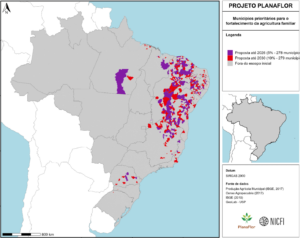PlanaFlor: new index highlights challenges and strategies to strengthen smallholder farming in Brazil
The newspapers O Globo and Valor Econômico have recently published a pivotal article emphasising how climate change exacerbates the vulnerability of smallholder farming in Brazil, which accounts for 70% of the food consumed in the country. The report is based on an index on the topic, developed by PlanaFlor, a strategic plan aimed at promoting concrete actions to facilitate the implementation of Brazil’s Forest Code (Federal Law L12651)
PlanaFlor outlines eight strategic macro-objectives for the Forest Code’s implementation, one of which is the promotion of sustainable small-holding farming, ensuring social inclusion and food security both in rural and urban areas. While smallholder farming isn’t directly regulated under the Forest Code, increased funding and incentives for sustainable farming practices have a direct impact on the law’s execution.
To support this effort, PlanaFlor has conducted a targeted study that prioritises municipalities with high levels of vulnerability in smallholder farming (study’s summary in Portuguese here, pages 58-61). A national-scale index was developed based on four criteria: density of smallholder farming properties, productivity of five main crops, social inequality, and deficits in Permanent Preservation Areas (APPs). The findings show that the northeastern hinterland has the highest levels of vulnerability: of the 557 municipalities identified as most fragile in the country, 78% are located in the northeast, and highlights other priority regions such as the north of Minas Gerais, and Paraná States, in Southwest Brazil (see map).
Priority municipalities for strengthening smallholder farming in Brazil

PlanaFlor proposes a comprehensive set of actions to support these municipalities, focusing on planning and regulatory adjustments, and emphasising the need to improve access to new technologies, enhance local skills, and facilitate access to credit. The index and the proposed actions aim to provide a sustainable path forward for helping to fortify smallholder farming while addressing the broader challenges posed by climate change and food security in Brazil.
Recently, PlanaFlor’s project manager, Marcelo Hercowitz, visited some of the most vulnerable municipalities in the Reconcavo region in Bahia, northeast Brazil. “During our visit, we were able to confirm the index’s effectiveness in identifying key municipalities to focus on for strengthening smallholder farming, despite the diversity of farming structures and the unique characteristics of each location,” said Marcelo.
PlanaFlor’s key findings for smallholder farming in Brazil:
- Food security in rural and urban areas: While the importance of smallholder farming is widely acknowledged, support for the sector remains uneven. The lack of technical assistance, barriers to credit access, difficulties in adopting new technologies, and low participation in public programmes, such as the Food Acquisition Programme (PAA), perpetuate these inequalities.
- Fragility of smallholder farming: The vulnerability index highlights priority regions for intervention. There are 557 municipalities with a high concentration of small-holdings, low productivity in essential crops (rice, beans, maize, cassava, and wheat), high levels of social inequality, and critical deficits in vegetation in Permanent Preservation Areas (APPs).
- Socioeconomic and environmental impacts: The most vulnerable municipalities are losing climate resilience and are becoming increasingly susceptible to extreme weather events such as storms and droughts. Investments in the restoration of native vegetation can mitigate these risks while also generating employment and income in the restoration supply chain (seeds and saplings), contributing to the Forest Code’s implementation and addressing hunger and food insecurity.
- Strategic vision and actions: PlanaFlor recommends a series of actions, including planning, regulatory reforms, increased budgets for small-holding farming, and incentives for sustainable practices. Key priorities include improving access to technology, enhancing productive capacities, and facilitating credit access.
- Investment requirements: To address these challenges, PlanaFlor has set specific targets: supporting 278 municipalities (the 5% most vulnerable) by 2026 and an additional 279 by 2030, reaching 10% of the most vulnerable municipalities. The estimated annual cost is R$3.8 billion, to be financed through public and private sources, including Pronaf and the Food Acquisition Programme (PAA), with annual government subsidies of R$750 million to support these initiatives.

